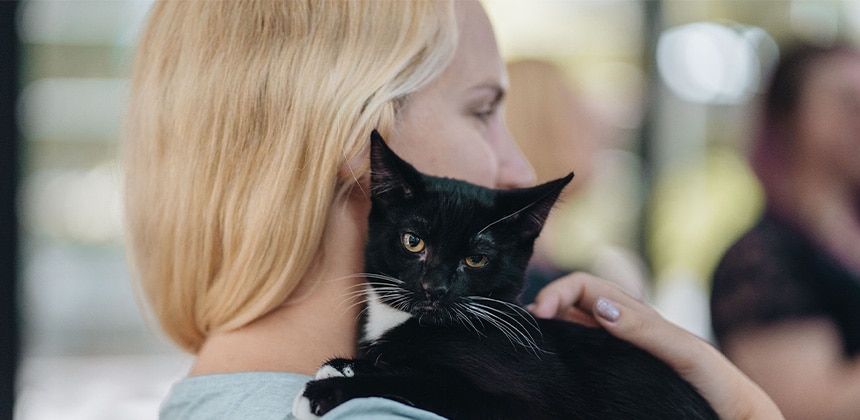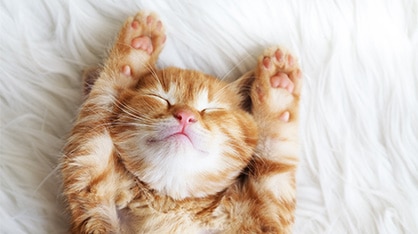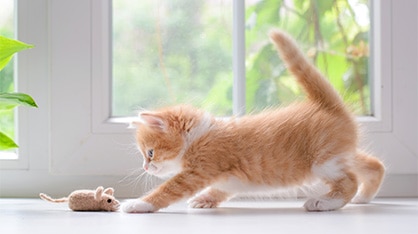- text
-
Everyday Pet Insurance policies entered into for the first time prior to 17 July 2023 and subsequent renewals of those policies are issued by The Hollard Insurance Company Pty Ltd ABN 78 090 584 473, AFSL 241436 (Hollard), arranged and administered by PetSure (Australia) Pty Ltd ABN 95 075 949 923, AFSL 420183 (PetSure) and promoted and distributed by Hollard’s Authorised Representative (AR) Woolworths Group Limited ABN 88 000 014 675, AR 245476 (Woolworths).
Everyday Pet Insurance policies entered into for the first time on or after 17 July 2023 and subsequent renewals of those policies are issued by PetSure and promoted and distributed by PetSure’s AR, Woolworths.Dr Harry Cooper (AR No.1000933) is an AR of PetSure and promotes Everyday Pet Insurance policies.
Any advice provided is general only and does not take into account your individual objectives, financial situation or needs. Please consider the Product Disclosure Statement (PDS) to ensure this product meets your needs before purchasing, or choosing to continue with the product. PDS and Target Market Determination available at insurance.everyday.com.au/pet-insurance.
Getting a kitten
Dr Harry shares his tips and tricks.
Pet Insurance | 7 minute read | 23 January 2025

Bringing home a new kitten is an exciting time for the whole family. To make everything go without a hitch is all but impossible, but a little bit of advanced planning can go a long way to avoiding catastrophes.
Choosing your kitten
I am a fanatic about keeping all cats indoors, so let’s start with your kitten. Most are sold somewhere between 8 and 12 weeks of age. You will likely buy from a pet shop, a breeder or perhaps a welfare organisation. The days of people having litters of kittens and giving them away are pretty rare.
The first thing you need to do is to protect this tiny fur ball against all the nasty infectious diseases that we see in cats. In most instances, your kitten will have had its initial vaccination and be microchipped. Most will probably be desexed as well. You will have a vaccination certificate with dates for further vaccinations and boosters, usually at 12 weeks and again at 16 to 18 weeks. Check with your local vet as to the schedule they recommend. This is also a great opportunity for your vet to give your kitten a complete health check, looking for skin problems like ringworm and ear infections, both of which can be quite common. You will also get advice about worming, flea and tick control. Yes, ticks too, believe it or not. People can bring paralysis ticks into the house with something as simple as a bunch of wildflowers.
Preparing your home for your kitten
Your home needs to be ‘kitten ready’. We are lucky that kittens are already toilet trained by their mum, and they know what the litter tray is for. Try and purchase one with a lid on. It will cut down the mess caused by over-exuberant raking over of the ‘deposit’. Keep the tray away from heavy traffic areas and away from food. Cats like to be private about their toilet habits. If you know what litter the kitten was used to, try to persist with the same for a while and if you want to make a change to some other product, then do it gradually over time until the kitten has settled in. I am a fan of pelleted paper.
Kittens love to go exploring in their new house, so beware of open cupboard doors. They are not likely to go tasting things, but if they accidentally dip their paws into something nasty, they will of course lick it off. For cats and kittens, smell is more important. Your biggest concern will be protecting the furniture. Kittens are just young cats and they hone their hunting skills by sharpening their claws on your furniture, your curtains, your fly screens, and even your clothing. Make sure you have a couple of good scratching posts installed in different rooms of the house. You can encourage your kitten to use them by hanging toys from the scratching posts. Feathers are great.
What should I feed my kitten?
Cats are very fussy about their food. To begin with, try and stick to the same diet that the kitten has been used to. Introduce new foods in small quantities added to the existing diet. Make all changes gradually. This allows the bowel time to become accustomed to the new food and avoids the likelihood of bowel upsets.
I like to use a mixture of wet and dry food. By wet, I mean canned food or fresh ‘meats’. Cats are true carnivores. They like fresh meat! Fresh water should always be available, close to the food. Some cats like to drink running water, so those small recycling water fountains are an extra if you have a fussy drinker. By the way; no regular milk please. Kittens don’t have the proper enzymes to break down cow’s milk and this may cause diarrhea and dehydration.
As for bowls, use stainless steel, glass, or glazed ceramic bowls. Avoid plastics as they tend to absorb certain smells and for many cats this is off-putting.

Where can my kitten sleep?
Now, where is this adorable kitten of yours going to sleep? This has to be a family decision. The toilet or the bathroom are not good choices. Both usually have concrete or dense floors that act as heat sinks. They are usually also the coldest rooms in the house and cats love to be warm. They prefer a donut shaped bed or better still, something that is dark inside. They like to feel secure. They like to hide. An ‘Igloo’ is ideal.
Try not to ‘over cuddle’ your kitten to begin with, and be sure to supervise young children, who can quite unintentionally squeeze a bit too hard, or worse still, drop that fluffy bundle. Remember even the claws on a kitten are extremely sharp, and if frightened they will use them.
Kitten training tips
How do you go about trying to train your kitten not to address all the above? I simply deny access. In other words. Close the door. When you do want to use the room and feel your expensive lounge may be in danger, I like to have on hand a syringe or water pistol filled with water and a little bit of lemon juice or vinegar (only a small amount, 5ml per 1 litre - just so they don’t like the taste). Once you see those claws come out, a couple of quick squirts will usually deter the cat away.
Use some reward toys. As I said earlier anything with feathers is just great. They also love those cheap little grey mice, ping pong balls, and the best thing ever: a piece of aluminum cooking foil, scrunched up into a ball. Cheap and easy to make. They usually end up under the lounge or the fridge. They will keep your kitten happy for hours. Just note the toy should be large enough so that it doesn’t pose a choking hazard to your kitten.

If you feel the need to let the kitten outside for an hour or two, my advice is don’t. Cats are responsible for impacting the wildlife of birds and reptiles. On top of that, they can be attacked by other neighbourhood cats, and develop a nasty abscess, or worse still contract what is commonly called ‘Feline Aids’ (feline immunodeficiency virus). On top of that, most cats fail to survive road accidents. With a bit of skill or a bit of cash, you can build or buy outside cat runs. They can be as simple or as complex as you like. They act like a reverse aviary; the cats are on the inside and the birds are on the outside. That way both enjoy safety, and your kitten can be amused by the activity in your backyard, that is of course when they are not sound asleep, in a sunny spot. The runs can be attached to the house via a window, so access is controlled.
And there we have it, 5 ways to prepare your home for your kitten. With a little work and patience you and your new kitten will be best friends.
Other articles you might like
Get a Pet Insurance quote online today
- text
-
Everyday Pet Insurance policies entered into for the first time prior to 17 July 2023 and subsequent renewals of those policies are issued by The Hollard Insurance Company Pty Ltd ABN 78 090 584 473, AFSL 241436 (Hollard), arranged and administered by PetSure (Australia) Pty Ltd ABN 95 075 949 923, AFSL 420183 (PetSure) and promoted and distributed by Hollard’s Authorised Representative (AR) Woolworths Group Limited ABN 88 000 014 675, AR 245476 (Woolworths).
Everyday Pet Insurance policies entered into for the first time on or after 17 July 2023 and subsequent renewals of those policies are issued by PetSure and promoted and distributed by PetSure’s AR, Woolworths.
Any advice provided is general only and does not take into account your individual objectives, financial situation or needs. Please consider the Product Disclosure Statement (PDS) to ensure this product meets your needs before purchasing, or choosing to continue with the product. PDS and Target Market Determination available at insurance.everyday.com.au/pet-insurance.



